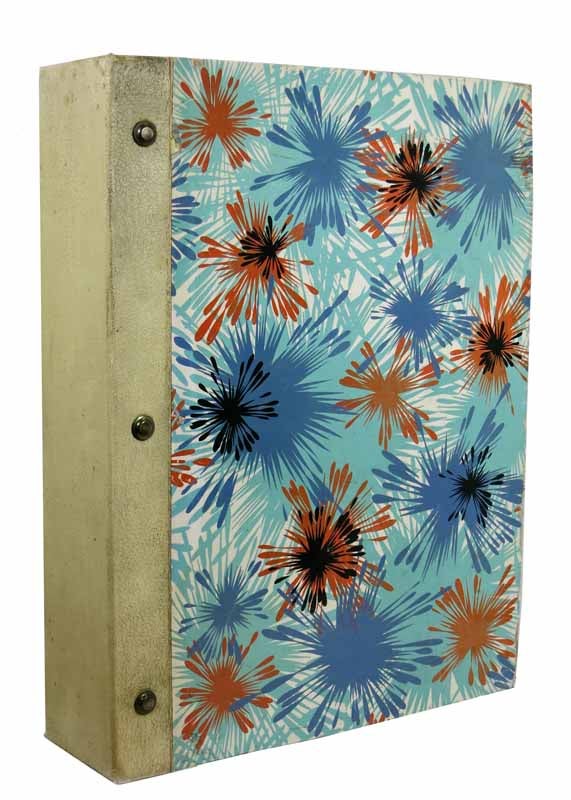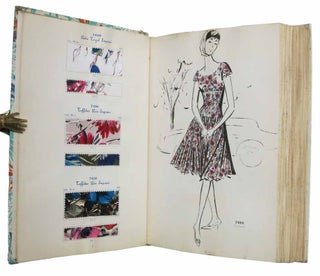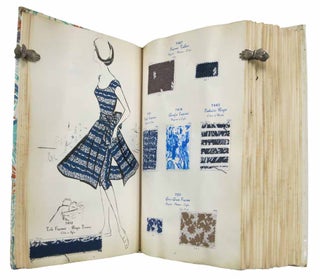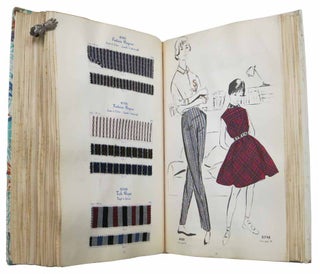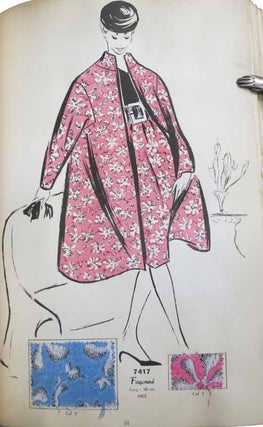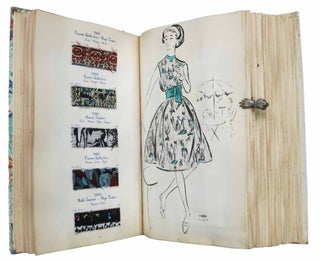SOCIETE PARITYS Et Les TISSUS LEBOTYS. Collection Été 1959.
Paris: Societe Paritys / Lebotys, 1959. 108 pp. 16 color fashion drawings; ~800 pasted and tipped-in fabric samples. 16-1/4" x 12". Post binder with 3 brass posts. Publisher's pictorial glazed boards, white cloth joints. Light extremity wear to boards; short split to rear joint. Page block lightly foxed, occasional foxing/spotting to margins throughout. Few white nylon fabric samples discolored by paste beneath. Fabric samples otherwise clean and bright, with only minor occasional creasing/fraying. Overall, VG. Item #42920
A mid-century salesman's sample catalogue from the summer collection of Parisian firm Société Paritys, a haberdashery and fabric supplier established in 1946 and still in operation today. The fabric samples have been supplied by Lebotys, a couture design firm in its own right, and highly regarded for the quality of its textiles. As we find record of Lebotys having issued catalogues of its own collections in both the 1930s and 1960s, we speculate that the two firms collaborated for a limited time, possibly due to continuing post-war shortages and the need to adapt to the rapidly changing clothing market of the 1950s.
The late 1950s saw a revolution in French fashion — and, by extension, Western fashion in general — due in no small part to the influence of material factors underlying the purely aesthetic side of the industry: availability of fabric, continuing technological advances in synthetics, and the surging post-war economies of America and Europe. The reluctant expansion of haute couture into the ready-to-wear market during the latter half of the century, and the increasing reliance on synthetic fabrics to meet the demand, would ultimately spell a major shift in the industry, one that would impact fashion trends for decades to come. Some fashion houses, like Dior, whose “New Look” revitalized fashion at the beginning of the decade, successfully managed to adapt by issuing couture ready-to-wear lines. Some, however, even long-established houses, survived the war only to be undone by the prosperity that followed.
The collaboration here of Société Paritys and Lebotys, as well as the fabrics offered and styles displayed, leads us to infer that the two firms were likely targeting the growing ready-to-wear market. The fabrics include a variety of silks, cottons, wools, mohair, muslin, cashmere, and others, as well as nylon, fibranne, rayon, Rhodia, tergal, crylor, acetate, Albène, and other “Matieres Synthètiques,” often in blends, and advertising their washable and/or (anti)wrinkling qualities. The styles in the illustrations, although still influenced by the “New Look,” also show the influence of Dior's successor, the young Yves St. Laurent, who debuted his "trapeze line" in 1958.
No copies located on OCLC, nor the major French institutions (as searched on KVK).
Price: $2,450.00


